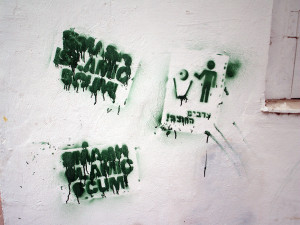Erdogan to the EU: Prove That You Oppose Islamophobia
 At a press conference in Djibouti on January 24, Turkish President Recep Tayyip Erdogan presented a challenge to the European Union, stating, “If you oppose Islamophobia, then you must admit Turkey into the EU.” The controversial leader boldly delivered an ultimatum, announcing that his rapidly growing country “will not come to the EU’s door to beg” for accession; “If Turkey is accepted, it will be a member. If they reject it, then it will make its own way.”
At a press conference in Djibouti on January 24, Turkish President Recep Tayyip Erdogan presented a challenge to the European Union, stating, “If you oppose Islamophobia, then you must admit Turkey into the EU.” The controversial leader boldly delivered an ultimatum, announcing that his rapidly growing country “will not come to the EU’s door to beg” for accession; “If Turkey is accepted, it will be a member. If they reject it, then it will make its own way.”
Turkey’s journey to accession has been a long, arduous process, as the country formally submitted its application for membership nearly 28 years ago. Although Turkey remains a transitioning economy with strong ties to the EU, it has maintained a middle ground economically with countries like Iran and Russia. The country has thriving energy and financial sectors, but has received international criticism regarding human rights and governmental issues.
Immediately following the Charlie Hebdo shooting in early January, Erdogan publicly condemned the event as a “heinous terrorist attack.” He called for solidarity among all nations against terrorism, stating, “terrorism has no religion or nationality and no excuse can be given for it.” Shifting gears, he then demanded swift action on the part of the European Union to address the issue of Islamophobia. Citing the $5.5 billion that Turkey has spent hosting 1.7 million Syrian refugees over the past few years, Erdogan pressured the EU to prove itself as a world leader by defending Muslims. "If the issue is not dealt with seriously today, and if populism takes European politicians captive, the EU and European values will come into question.”
His press conference in Djibouti, a fellow Muslim country, was delivered in the same vein, as Erdogan spoke on terrorism and other diplomatic challenges. Asserting that Turkey had an appreciation for cultural and religious differences, Erdogan again condemned the Charlie Hebdo terrorist attacks for fueling the growing sentiment of “Islamophobia” in the West.
He quickly turned to the topic of Turkey’s accession into the EU, declaring, “We are testing Europe. Will Europe be able to accept a country that has a Muslim population?” Noting Turkey’s status as a member country in NATO, OECD, and other international organizations, Erdogan questioned the EU’s reluctance to admit Turkey. Unless the European Union accepts Turkey, his theory of the EU as a “Christian club” will be confirmed.
Erdogan has protested against the EU’s apparent Islamophobia, and in recent years, Turkey has appeared to be moving—socially and economically—further away from potential accession into the EU. Turkey’s negotiations with the European Union for membership began nearly a decade ago in 2005, but remain somewhat stalled today.
Commenting on the decline in EU enthusiasm, Dr. İhsan Dağı, a professor at the Middle East Technical University in Ankara, Turkey stated that, “only 20 percent of the [Turkish public] regard EU membership as possible and only 40 percent support Turkey’s EU membership objective.” Public support of joining the European Union, and the confidence that accession will actually happen, has dwindled as a result of stagnant EU accession talks.
In 2003, EU countries accounted for 55 percent of Turkey’s trade. Ten years later, this share has dropped significantly to approximately 40 percent. According to data provided by the Research Turkey organization, Turkey’s exports to the EU dropped to a new low in 2012. These economic changes seemingly indicate that Turkey is shifting its attention away from the “Christian Club” members and towards the solidification of its economic partnerships elsewhere--to the East and Middle East.
